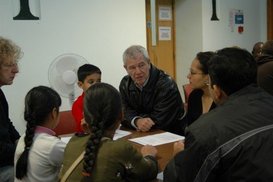PARTICIPATORY ACTION RESEARCH
|
About our research Power differences exist and, within this economic period, grow. They are material and ideological, formal and formal, and they both inhibit and complicate participatory processes. Power is expressed within physicial environments through human activity that occurs inside of structural and organizational hierarchies. It is we, human beings, who generate and reproduce power relations through regulations and policies designed to apply those regulations within our service development and delivery. |
|
At the same time, it is also we who can interrogate, challenge and even alter those power relations within our individual and group interactions – but, first of all, we have to decide that we want to make changes happen.
RAPAR began to reach the national media with our research about what was happening to people seeking asylum from both Iraq (2003) and Somalia (2004) and to their local communities here. However, during 2004-5, RAPAR faced highly concentrated - and highly placed - efforts to stop its work in its tracks; see 2011 University of Oxford PhD thesis by Joshua Hatton entitled How and why did migration and refugee studies (MARS) facilitate migration control? (click here for pdf) particularly section 4.3. on power and practice (pp.254-278).
Sustaining RAPAR’s commitment to ‘participation as equals’ within our practice demands that, as practitioners ourselves, we continuously reflect-in-action. In our approach with participants, we aim to model the very attitudes, behaviours and actions that enable participatory learning to begin and grow: do as I do, not as I say you should do! RAPAR's work led to the publishing of the first ever book anywhere in the world on Doing Research With Refugees. This included a set of guidelines funded by the ESRC. With our commissioners and participants, we co-construct and then sustain temporarily safe environments within which to:
RAPAR began to reach the national media with our research about what was happening to people seeking asylum from both Iraq (2003) and Somalia (2004) and to their local communities here. However, during 2004-5, RAPAR faced highly concentrated - and highly placed - efforts to stop its work in its tracks; see 2011 University of Oxford PhD thesis by Joshua Hatton entitled How and why did migration and refugee studies (MARS) facilitate migration control? (click here for pdf) particularly section 4.3. on power and practice (pp.254-278).
Sustaining RAPAR’s commitment to ‘participation as equals’ within our practice demands that, as practitioners ourselves, we continuously reflect-in-action. In our approach with participants, we aim to model the very attitudes, behaviours and actions that enable participatory learning to begin and grow: do as I do, not as I say you should do! RAPAR's work led to the publishing of the first ever book anywhere in the world on Doing Research With Refugees. This included a set of guidelines funded by the ESRC. With our commissioners and participants, we co-construct and then sustain temporarily safe environments within which to:
- unpack the challenges together: What are they? Where are they coming from? What about them do we want to be different?
- make explicit our individual and collective, professional and personal, relationships to these challenges: Whose interests do they serve? Why do we need to tackle these challenges?
- explore what we want to do - and can do - to work around them and through them to reach our goals.
Methodologies:
Our Participatory Action Research approach (the 'PAR' of 'RAPAR') combines the principles of Action Research first expressed by Lewin (1946) with those of Action Learning, as explained by Revans in his ABC of Action Learning (1998). Lewin asserts that ways of doing action research - as opposed to purely academic research - should be consciously developed so that constructive changes can take place in the real world during the life of the research itself. Revans focuses on the inseparability of action and learning and he identifies that participation in action learning processes is “the child, not of power, but of communal need" (1976).
However, becoming able to participate in culturally sensitive ways is vital. In RAPAR we adapt the techniques developed through participatory rural appraisal in ‘developing’ countries and the modifications of that approach which have been explored through asset based community development in the ‘developed’ world.
People participate when they realise that they have to if they want positive changes to take place. Ideally, that participation should include representatives of all the different groups that are involved in the thing that needs to change.
However, becoming able to participate in culturally sensitive ways is vital. In RAPAR we adapt the techniques developed through participatory rural appraisal in ‘developing’ countries and the modifications of that approach which have been explored through asset based community development in the ‘developed’ world.
People participate when they realise that they have to if they want positive changes to take place. Ideally, that participation should include representatives of all the different groups that are involved in the thing that needs to change.


